UK warns of increased 'terror threat' after Tunisia attack
Prime Minister David Cameron on Monday pledged a wide response to extremism, describing Britain as being united in grief over the beach massacre in Tunisia.
Fifteen Britons are confirmed dead, but officials have warned that figures could rise as high as 30, making it the worst terror attack on UK citizens since the July 7, 2005 London bombings.
"This is an absolutely horrific attack and I know it's shocked the whole of the country, the whole of the world," Cameron said.
| We are a target. They have declared war on us... whether we like it or not - David Cameron |
Britain's international terror threat is currently set at "severe," its second highest level.
"We are a target. They have declared war on us... whether we like it or not," he added.
Britain dispatched a Boeing C17 military transport plane to Tunisia on Monday to evacuate tourists wounded in the massacre.
Home Secretary Theresa May has travelled to the north African nation for talks on the extremist threat and to offer condolences for the slain tourists.
Speaking at a joint press conference with her German, French and Tunisian counterparts after visiting the scene of the killings at the Tunisian beach resort, May vowed that "the terrorists will not win".
"We will be united in working together to defeat them but united also in working to defend our values" the minister said.
Some 600 British counterterrorism police - one of the force's largest such deployments in recent years - have been deployed as part of the investigation into Friday's attack at the Imperial Marhaba Hotel in the beach resort of Sousse.
Officers have also been deployed at airports to meet and support travellers and to help identify witnesses.
"Hundreds of police are working on this operation both in Tunisia and here at home," Cameron wrote in the Daily Telegraph newspaper, which said this was the largest such investigation since the 2005 attacks.
"We must be more intolerant of intolerance - rejecting anyone whose views condone the Islamist extremist narrative and create the conditions for it to flourish," Cameron said, calling for "a response at home and abroad".
"Carrying out such an attack during the holy month of Ramadan was an insult to all Muslims worldwide", Cameron added.
"This is not the war between Islam and the West that ISIL want people (to) believe. It's between the extremists who want hatred to flourish and the rest of the world who want freedom to prosper."
He called for efforts against online propaganda by groups like ISIS, which claimed responsibility for the attack, but also said there was a need to strengthen political institutions abroad.
"We must also deal with it at its source, in places like Syria, Iraq and Libya, from where ISIL is peddling and plotting its death cult," Cameron wrote, using another term for IS.
The British leader also expressed his frustration over the use of the term "Islamic State" saying it gives undue credibility to the “poisonous death cult” that is “seducing” young Britons to go and fight for the terrorist organisation in Syria and Iraq.
"What it is, is an appalling barbarous regime that is a perversion of the religion of Islam and many Muslims listening to this programme will recoil every time they hear the words" he told the Today programme.
Flags will be flown over Downing Street on Monday in sympathy with the victims and their families.





 Follow the Middle East's top stories in English at The New Arab on Google News
Follow the Middle East's top stories in English at The New Arab on Google News


